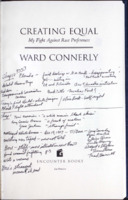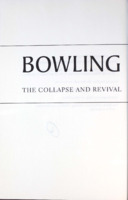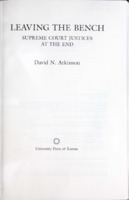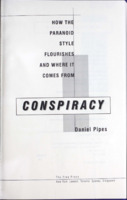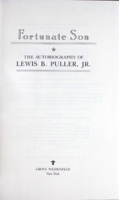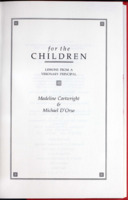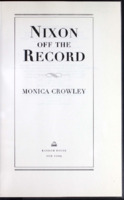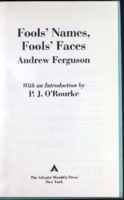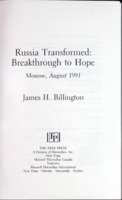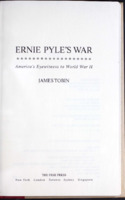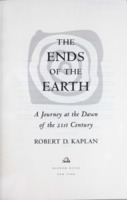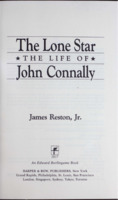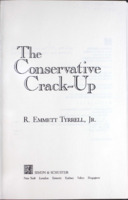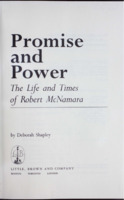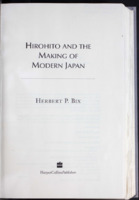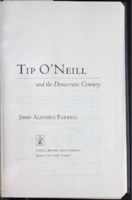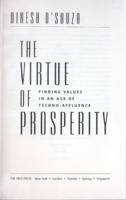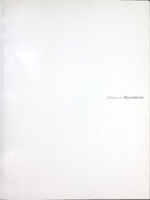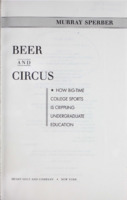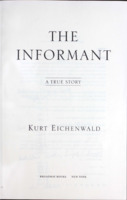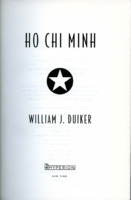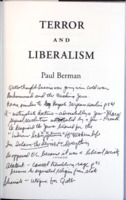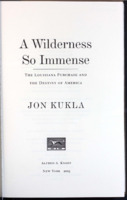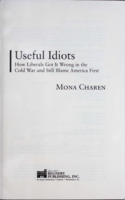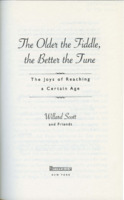Search
540 items
-
Creating equal : my fight against race preferences
A story of the author's life and his struggles with "America's racial divide." As a member of the University of California Board of Regents, the author was drawn into the controversy surrounding affirmative action and "finally concluded ... that this phrase was merely a polite euphemism for an entrenched system of race preferences that psychologically damages its alleged beneficiaries and unjustly discriminates against its real victims."--Jacket. -
Bowling alone : the collapse and revival of American community
Putnam's work shows how social bonds are the most powerful predictor of life satisfaction. For example, he reports that getting married is the equivalent of quadrupling your income and attending a club meeting regularly is the equivalent of doubling your income. The loss of social capital is felt in critical ways: Communities with less social capital have lower educational performance and more teen pregnancy, child suicide, low birth weight, and prenatal mortality. Social capital is also a strong predictor of crime rates and other measures of neighborhood quality of life, as it is of our health: In quantitative terms, if you both smoke and belong to no groups, it's a close call as to which is the riskier behavior.--BOOK JACKET. -
Leaving the bench : Supreme Court justices at the end
Life appointments make Supreme Court justices among the most powerful officials in government and allow even dysfunctional judges to stay on long after they should have departed. For that reason, when a justice leaves the bench is often as controversial as when he's appointed. This first comprehensive historical treatment of their deaths, resignations, and retirements explains when and why justices do step down. It considers the diverse circumstances under which they leave office and clarifies why they often are reluctant to, showing how factors like pensions, party loyalty, or personal pride come into play. It also relates physical ailments to mental faculties, offering examples of how a justice's disability sometimes affects Court decisions.--BOOK JACKET."Ultimately, Atkinson shows just how human these people are and enhances our understanding of how the Court conducts its business. He also suggests specific ways to improve the present situation, weighing the pros and cons of mandatory retirement and calling for reform in the delegation of duties to law clerks - who in recent years have dominated the actual writing of many justices' decisions."--BOOK JACKET."As the current Court ages, how long might we expect justices to remain on the bench? Because our next president will likely make several appointments, now is the time to consider what shape the Supreme Court will take in the next century. Offering a wealth of information never before collected, Leaving the Bench provides substantial grist for that debate and will serve as an unimpeachable reference on the Court."--BOOK JACKET. -
Conspiracy : how the paranoid style flourishes and where it comes from
Was AIDS intentionally inflicted upon blacks by whites? Was JFK assassinated as part of an intricate conspiracy? Daniel Pipes traces conspiracy theories through history and convincingly shows how they have been used as common tools of mass manipulation in the West and have more recently cropped up in the Third World and among disempowered fringe groups. -
Fortunate son : the autobiography of Lewis B. Puller, Jr.
A Vietnam veteran who lost both legs and a hand in the Vietnam War recounts his homecoming and his attempts to come to terms with his life. -
For the children : lessons from a visionary principal
Educator Madeline Cartwright explains how she transformed a public school and shares her secrets and hopes for all public schools. -
Nixon off the record
With fully reconstructed conversations based on extensive notes made at the time, Nixon off the Record puts the reader in the room with the thirty-seventh president, listening to his views on leadership, his opinions of White House predecessors and successors, his activities and thoughts during the 1992 presidential campaign and election, and his assessment of Bill Clinton's first year in office and his potential challengers in 1996. Nixon's views give voters uncommon criteria by which to measure presidential candidates - including Bob Dole - and their ability to exercise effective leadership. Richard Nixon was one of the most controversial and indestructible presidents of the twentieth century. With her privileged perspective and unlimited access to Nixon, Crowley has written a perceptive and spirited memoir that shows not just what Nixon thought in the last years of his life but who he was. She offers an unprecedented behind-the-scenes view of Nixon's activities and opinions, giving the reader a front-row view of recent American political history. Nixon's unparalleled experience placed him in a unique position to judge leaders who had come before and after. His assessments are candid, astonishing, and sometimes explosive. This book places those judgments in context and brings them alive for the last American presidential election of the twentieth century. -
Fools' names, fools' faces
Andrew Ferguson's collection of thirty-two essays reprinted from the New Republic, the Wall Street Journal and other publications. -
Russia transformed : breakthrough to hope : Moscow, August 1991
James Billington examines the changes that have occurred in the former Soviet Union over recent years. -
Ernie Pyle's war : America's eyewitness to World War II
When a machine-gun bullet ended the life of war correspondent Ernie Pyle in the final days of World War II, Americans mourned him in the same breath as they mourned Franklin Roosevelt. To millions, the loss of this American folk hero seemed nearly and great as the loss of the wartime president. If the hidden horrors and valor of combat persist at all in the public mind, it is because of those writers who watched it and recorded it in the faith that war is too important to be confined to the private memories of the warriors. Above all these writers, Ernie Pyle towered as a giant. Through his words ad his compassion, Americans everywhere gleaned their understanding of what they came to call "The Good War." Pyle walked a troubled path to fame. Though insecure and anxious, he created a carefree and kindly public image in his popular prewar column - all the while struggling with inner demons and a tortured marriage. War, in fact, offered. Pyle an escape hatch from his own personal hell. It also offered him a subject precisely suited to his talent - a shrewd understanding of human nature, an unmatched eye for detail, a profound capacity to identify with the suffering soldiers whom he adopted as his own, and a plain yet poetic style reminiscent of Mark Twain and Will Rogers. These he brought to bear on the Battle of Britain and all the great American campaigns of the war - North Africa, Sicily, Italy, D-Day, and Normandy, the liberation of Paris, and finally Okinawa, where he felt compelled to go because of his enormous public stature despite premonitions of death. -
The ends of the earth : a journey at the dawn of the 21st century
In The Ends of the Earth, Robert D. Kaplan travels from the devastated countries of West Africa and the fundamentalist enclaves of Egypt and Iran to the culturally explosive lands of Central Asia, India, Pakistan, and Southeast Asia with hardly more than a notebook and a backpack. Kaplan's intention was to investigate firsthand the effect of population explosion and environmental degradation in these countries and to see how the various cultures he encountered responded to them. But as he traveled, talking to gun smugglers and government ministers, warlords and shantytown dwellers, he discovered that the real problem, in places as far afield as Sierra Leone and western China, was the reemergence of longstanding cultural rivalries and the dissolution of national boundaries as regions redefine themselves along ethnic and historic lines.Kaplan's ground-level experiences allow him to avoid grandiose generalizations about the clash of civilizations and to replace them with intimate portraits of the men and women he encounters: Rafighdoost, Khomeini's fiercely loyal chauffeur; Ali Abdel Razag, keeper of the Aswan High Dam; and Ayshe Tanrikulu, a squatter on Golden Mountain, a shantytown on the outskirts of Ankara, who hopes that her sons will one day be doctors or engineers. It is in the squalor of daily existence and in people's fears, frustrations, and dreams that Kaplan looks for the key to a country's future. The Ends of the Earth offers an intimate portrait of the devastated parts of the world, whose cultural disasters - like those in Bosnia, Chechnya, and Rwanda today - will dominate our attention and remake the world of tomorrow. -
The lone star : the life of John Connally
A biography of Connally's life includes his twenty years of political power, his return to Texas and riches, and then bankruptcy. -
The conservative crack-up
R. Emmett Tyrrell, Jr.'s commentary of the state of conservatism during the 1990s. -
Promise and power : the life and times of Robert McNamara
Promise and Power: The Life and Times of Robert McNamara is the first major biography, and only complete history, of this enigmatic man who has been a towering figure of the twentieth century. Here is the dramatic story of a brilliant but flawed leader who struggled endlessly to reconcile his Berkeley-bred social conscience with his raw drive for power. From his position as the wunderkind president of the Ford Motor Company, to his reign as secretary of defense during the Vietnam War, through his efforts as the president of the World Bank, Deborah Shapley paints an electric portrait of Robert Strange McNamara. To a generation of Americans, the name McNamara spells a nightmare in jungle green: Vietnam. Promise and Power traces how McNamara shaped the American commitment in Vietnam - and his devastating inner realization of his error. McNamara has remained silent on the war since February 1968, when he stepped down as America's secretary of defense, but in this book, for the first time, he admits, "The greatest failure of all was Vietnam." Promise and Power shows, as no other book has, how the moral ambiguity all Americans feel about Vietnam's shocking result is shared by the man who led them there. But McNamara's life story spans a wider swath of our history. Shapley describes his roots in the generation of Americans who came of age in the 1930s, his upbringing in the plain town of Oakland, California, and formative years at the liberal Berkeley campus and Harvard Business School. After World War II, talent and raw ambition pushed him to the top of Ford; he became president in 1960 and reshaped the organization. Yet he fought the company's values, too, and drew up plans to change Ford to meet foreign competition - revealed here for the first time. McNamara's fame as a captain of industry who also read Teilhard de Chardin spurred President-elect John F. Kennedy to name him secretary of defense. With Camelot-inspired activism, McNamara used management controls to revolutionize the American military, revealing the driven man whom the press dubbed "I've-Got-All-the-Answers McNamara." Promise and Power is the first profile of how McNamara was changed by failure and by the discovery all Americans made in the 1970s of the strength and power of the Third World. As president of the World Bank, McNamara marched through slums and shantytowns, holding out the promise of effective aid. He either saved the Third World or lost it, depending, of course, on which government's or banker's view is believed. Promise and Power, featuring exclusive interviews with the subject himself and four hundred other participants, and meticulous research, explores the effects of war and remembrance on this complex figure. Robert McNamara, the private individual and the public technocrat, stands before us, in light and shadow, as a remarkable man whose own promise and power changed America, and the world. -
Hirohito and the making of modern Japan
A biography of the Japanese emperor reveals a powerful man who successfully cultivated an image of a reluctant king while manipulating important events behind the scenes for five decades. -
Tip O'Neill and the Democratic century
The towering figure of the postwar Democratic Party, Thomas Tip" O'Neill was one of the last of the great political warhorses, a man who cared as much about his family and friends as he did about the issues, someone who knew how to have a good time and do a good deed. Now, based on previously untapped records, interviews, and private correspondence, prizewinning journalist John A. Farrell gives us the first full-scale biography of this legendary American: a garrulous legislative titan who fought with Richard Nixon, Ronald Reagan, and Newt Gingrich and prevailed because he never forgot where he came from." "In Tip O'Neill and the Democratic Century John Farrell has crafted an epic biography, not just of a person, but of politics. Full of larger-than-life personalities and historic moments, it is a grand waltz through the corridors and back rooms of American power. And like Tip himself, Farrell's dazzling book is majestic, powerful, important, and utterly winning."--BOOK JACKET. -
The virtue of prosperity : finding values in an age of techno-affluence
Discusses the potential problems of technological advancement in America, such as class conflict and transformation of the human race due to life-span lengthening and parents' choosing children's genetic makeups, and proposes ways of using technology to promote overall prosperity while preserving values. -
Boundaries
Work by Maya Lin which explores her personal strategy for achieving balance in her work and life. -
Beer and circus : how big-time college sports is crippling undergraduate education
Murray Sperber takes us beyond the headlines and the public controversies to explore the profound and tragic impact of big-time intercollegiate athletics on undergraduate education. Sperber explodes cherished myths about college sports, particularly at Big-time U's," the large public research universities with high-profile men's football and basketball teams playing at the top level of the NCAA."."Using research culled from students, faculty, and administrators around the country, Sperber proves that many schools, because of their emphasis on research and graduate programs, no longer give the majority of their undergraduates a meaningful education. What they offer instead is a meager and dangerous substitute: the party scene surrounding college sports that Sperber calls "beer and circus" and which serves to keep the students happy while tuition dollars keep rolling in."."Sperber explains how this beer-and-circus scene has evolved over many generations. He details the pernicious roles of the media and corporations looking to tap into the lucrative student market, raising the particular concern of the current epidemic of student binge drinking, which in many ways results from these complex factors."--BOOK JACKET. -
The informant : a true story
Chronicles the FBI's attempts to infiltrate one of America's most powerful corporations, using information supplied to them by one of the company's employees. -
Ho Chi Minh
Describes Ho Chi Minh's poverty-stricken youth, his expatriate years in the U.S., France, and the Soviet Union, and his commitment to the Vietnamese revolution and reunification of Vietnam under Communist rule. -
Terror and liberalism
Berman shows how a genuine spiritual inspiration can be twisted into a fanatical demand for murder. He offers remarkable insights into the trends and conflicts influencing Islamic radicalism. He illuminates the surprising connections between very different political movements, and he reveals the several ways in which Islamic extremism resembles some all-too-familiar episodes in American and European experience. "Berman draws on sources that range from Albert Camus's The Rebel to the Book of the Revelation - from Lincoln's Gettysburg Address to the Islamist scholar Sayyid Qutb's magisterial In the Shade of the Koran. Berman condemns the foreign policy "realism" of the political right, and he diagnoses the naivete of the political left. He calls for a "new radicalism" and a "liberal American interventionism" to promote democratic values throughout the world - a vigorous new politics of American liberalism."--BOOK JACKET. -
A wilderness so immense : the Louisiana Purchase and the destiny of America
Publisher's description: The remarkable story of the land purchase that doubled the size of our young nation, set the stage for its expansion across the continent, and confronted Americans with new challenges of ethnic and religious diversity. In a saga that stretches from Paris and Madrid to Haiti, Virginia, New York, and New Orleans, Jon Kukla shows how rivalries over the Mississippi River and its vast watershed brought France, Spain, Great Britain, and the United States to the brink of war and shaped the destiny of the new American republic. We encounter American leaders--Jefferson and Jay, Monroe and Pickering among them--clashing over the opening of the West and its implications for sectional balance of power. We see these disagreements nearly derailing the Constitutional Convention of 1787 and spawning a series of separatist conspiracies long before the dispute over slavery in the territory set the stage for the Missouri Compromise and the Civil War. Kukla makes it clear that as the French Revolution and Napoleon's empire-building rocked the Atlantic community, Spain's New World empire grew increasingly vulnerable to American and European rivals. Jefferson hoped to take Spain's territories--piece by piece, --while Napoleon schemed to reestablish a French colonial empire in the Caribbean and North America. Interweaving the stories of ordinary settlers and imperial decision-makers, Kukla depicts a world of revolutionary intrigue that transformed a small and precarious union into a world power--all without bloodshed and for about four cents an acre. -
Useful idiots : how liberals got it wrong in the Cold War and still blame America first
The author attacks American liberals as naive and disingenuous in their dealings with the world, accusing them of rewriting history to portray themselves as "Cold Warriors" along with conservatives. -
The older the fiddle, the better the tune : the joys of reaching a certain age
The author collects advice, anecdotes, and opinions from friends, family, and celebrities--including Maya Angelou, Yogi Berra, Bill Cosby, and others--to capture the joys of turning older and the challenges that accompany the process.
